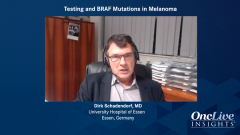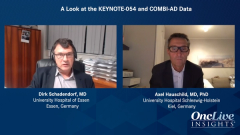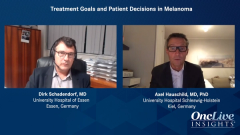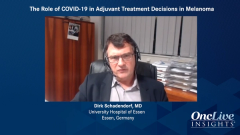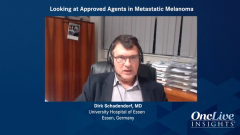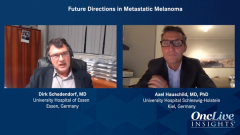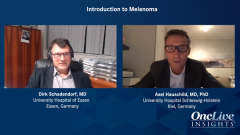
Introduction to Melanoma
Episodes in this series

Axel Hauschild, MD, PhD: Hello. This is Axel Hauschild from the University Hospital Schleswig-Holstein in Kiel in northern Germany. I’m a professor of dermatology and head of the Skin Cancer Center, and I’d like to welcome you to our discussion with Professor Dirk Schadendorf, who is the head of dermatology at the University Hospital of Essen in western Germany.
Dirk, it’s a great pleasure to chat with you about the latest news on adjuvant and stage IV melanoma treatment. Hello.
Dirk Schadendorf, MD: Hello, Axel. It’s a pleasure.
Axel Hauschild, MD, PhD: We want to start with a description of the multidisciplinary team setting at your center. How are the decisions made in melanoma treatment in general?
Dirk Schadendorf, MD: Our patients who are entering the center will be seen by specialists who have certain training, and all the cases will be discussed in multidisciplinary tumor rounds on a regular basis. This obviously includes all advanced melanoma cases: stages III, stage IV, as well as other advanced skin cancer cases since we are a dedicated skin cancer center here in Essen.
Axel Hauschild, MD, PhD: Dirk, give me an idea about the number of cases you are discussing. Is it once per week or twice per week?
Dirk Schadendorf, MD: We are doing it once per week, and we are usually discussing between 30 to 40 cases a week. It’s always on Wednesdays, and we will usually take roughly 90 to 120 minutes.
Axel Hauschild, MD, PhD: I need to say that Professor Schadendorf’s center is the largest center in Germany, and it is certainly one of the largest in the world. Professor Schadendorf is a key opinion leader, so it’s not surprising that it’s 30 to 40 cases. In our center, it’s 15 to 20, and this shows the difference in the magnitude of the patients.
Dirk, what are therecommended guidelines for the adjuvant treatment in stage III, not only in your center but also in Germany, because you were a crucial part of the German Malignant Melanoma S3-Guidelines?
Dirk Schadendorf, MD: Yes. We have treated patients in stage II and stage III for quite some time with interferon, which is based on the long history of high-dose, intermediate-dose, and low-dose interferon within different time periods. This time has gone. For 3 years, we have had registration data on dabrafenib and trametinib, the COMBI-AD study, as well as 2 checkpoint inhibitors given as monotherapy: pembrolizumab and nivolumab.
On these data we have now 3 to 5 years of follow-up, and we have a clear idea of the clinical effects on relapse-free survival, distant metastases-free survival, and also first overall-survival data are available for these agents.
Axel Hauschild, MD, PhD: The tradition of interferon treatment in Germany is now gone, and all the centers are using these 3 treatment options, which are not only approved in Europe and therefore approved in Germany, but they are also fully reimbursed for every patient. It is totally independent of any insurance.
Transcript Edited for Clarity


